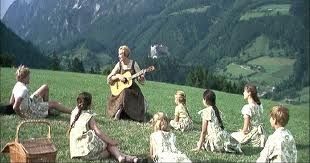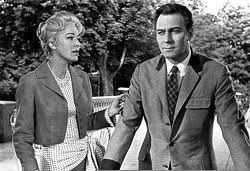
"The hills are alive with the sound of music!"
Okay, after my comment about Julie Andrews in the last post, I have to say she is great in this. While I didn't like this movie growing up, I now think it's terrific. The music is good, Captain von Trapp is charming, there's a nice love story, and the Nazi backdrop made things tense and suspenseful.
Maria is training to be a nun, but doesn't seem quite cut out for it: "You know how Sister Berthe always makes me kiss the floor after we've had a disagreement? Well, lately I've taken to kissing the floor whenever I see her coming, just to save time." Kind of reminds me of when Amelia puts herself in timeout. Mother Abbess thinks Maria might have a different destiny, and sends her to be governess to Captain von Trapp's seven unruly, motherless children.
Captain von Trapp is initially skeptical upon seeing her appearance, and suggests she change her dress before meeting the children. Maria explains, "But I don't have another one. When we entered the abbey our worldly clothes were given to the poor." "What about this one?" he asks. "The poor didn't want this one," she replies.
Maria quickly wins the children over, but irritates Captain von Trapp by undermining his strict, military-like household with playtime and singing: "The first rule of this household is discipline." It's not too long, however, before she wins him over as well: "You brought music back into the house. I had forgotten." Captain von Trapp is planning to marry a woman named Baroness Schroeder, but things get complicated when he starts to have feelings for Maria. The scene when the two are dancing is so elegant and romantic -I love it!

The Baroness notices their obvious chemistry, and at first tries to drive Maria away by making her aware of her feelings: "There's nothing more irresistible to a man than a woman who's in love with him." Realizing that the Baroness is right, and that she is in love with the captain, Maria is overwhelmed by her feelings and runs back to the abbey: "There were times when we would look at each other - oh Mother, I could hardly breathe." But Mother Abbess reminds her, "Maria, these walls were not meant to shut out problems. You have to face them. You have to live the life you were born to live." While Maria is gone, the Baroness decides to bow out, telling Captain von Trapp that "Somewhere out there is a lady who I think will never be a nun. Auf Wiedersehen, darling." When Maria returns, the captain tells her that the engagement is off, saying, "Yes. Well, you can't marry someone when you're in love with someone else... can you?"

In the meantime, the Nazis have taken over Austria, and they want Captain von Trapp on their side, which isn't going to happen. He is a true and loyal Austrian patriot, and ardently anti-Nazi, which puts his life in jeopardy. His friend, Max, urges Maria to try to convince him to at least pretend to toe the line, but she tells him, "I can't ask him to be less than he is."
 By the time Captain von Trapp and Maria marry, this has reached a boiling point, and the family must escape Austria. It broke my heart watching Captain von Trapp sing Edelweiss, an Austrian song, with tears in his eyes -knowing he must leave his beloved homeland behind: "My fellow Austrians, I shall not be seeing you again perhaps for a very long time. I would like to sing for you now... a love song. I know you share this love. I pray that you will never let it die."
By the time Captain von Trapp and Maria marry, this has reached a boiling point, and the family must escape Austria. It broke my heart watching Captain von Trapp sing Edelweiss, an Austrian song, with tears in his eyes -knowing he must leave his beloved homeland behind: "My fellow Austrians, I shall not be seeing you again perhaps for a very long time. I would like to sing for you now... a love song. I know you share this love. I pray that you will never let it die." A very suspenseful escape scene ensues, with the eldest daughter, Liesl, devestated to be betrayed by her first love, Rolf, when he alerts the Nazis of their location. They manage to get away with the aid of the nuns at Maria's old abbey.
The film ends with the family crossing the Alps on their way to freedom and an uncertain future, but happy to be together.
Another classic musical.
No comments:
Post a Comment